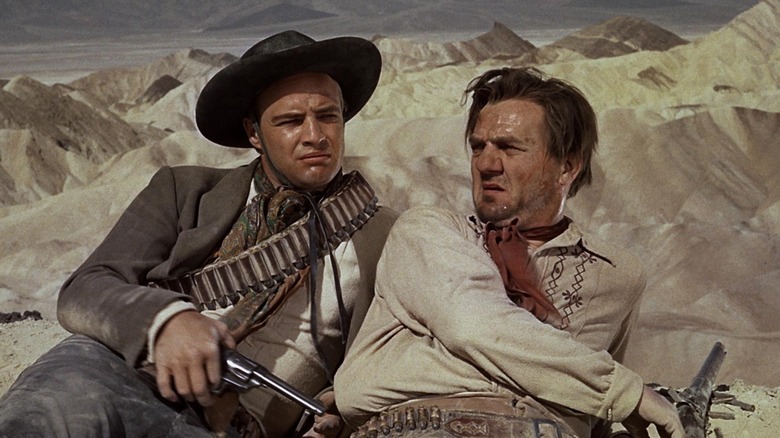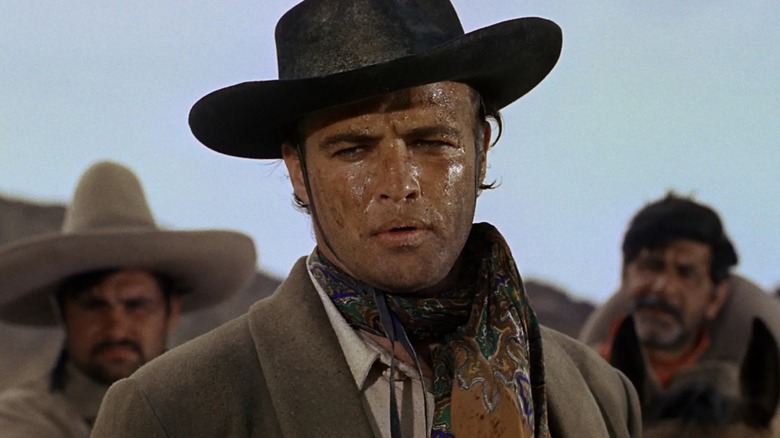The Twilight Zone's Rod Serling Helped Create One Of The Best Westerns Of All Time
"One-Eyed Jacks" might have been Marlon Brando's sole directing stint, but the 1961 western comes as close to perfection as possible within the confines of the genre. A high-stakes robbery acts as a catalyst for the dramatic ebb and flow that defines the unforgettable story, where a man contends with the heinous betrayal by his mentor, the father figure who has shaped him into the person he is today. This brooding, brokenhearted man, Rio (Brando) flits between vengeance and forgiveness, with a budding romance complicating the instinctual need to settle scores the old-fashioned way. The film is also stunning to behold, its gaze lingering on beautiful landscapes that blend the romanticism of Westerns with the naturalistic impulses within its complicated characters.
The making of such an intense, kinetic drama was filled with roadblocks, and Brando was not involved with it from the get-go. "One-Eyed Jacks" was initially intended to function as an adaptation of Charles Neider's classic western, "The Authentic Death of Hendry Jones," a blunt, vicious tale about the final days of an outlaw, set in a world devoid of traditional morals or societal rules. In 1951, producer Frank P. Rosenberg bought the rights to Neider's book, and a string of writers took turns to flesh out a compelling story that would do justice to Neider's vision (via Los Angeles Times).
Among them was Rod Serling, who would go on to become the creator and host of "The Twilight Zone" in a few years, and his treatment of the story saw a relocation from New Mexico to California, but remained mostly faithful to Neider's novel. Unfortunately, this adaptation was rejected by Rosenberg.
Rod Serling was one among many screenwriters hired for One-Eyed Jacks
Not much is known about Serling's screenplay draft except that he was involved with the project until Rosenberg passed it on to director/screenwriter Sam Peckinpah, who later used parts of this working screenplay to direct "Pat Garrett and Billy the Kid" in 1973 (which underwent critical reappraisal years after the controversy surrounding its release). Per Criterion, other writers attached to the project after Peckinpah were Calder Willingham and Guy Trosper, with the latter being the final screenwriter brought on the team by the time Brando stepped up to direct the western.
Although Peckinpah's version of the adaptation was initially considered perfect, prompting Rosenberg to send it to Brando, whose Pennebaker Productions bought the rights and arranged for Stanley Kubrick to direct for Paramount, he was fired by Brando himself due to unknown reasons. With Kubrick set to direct, it seemed that "One-Eyed Jacks" was finally on the right path, but Kubrick swiftly exited two weeks before production started. The reason? Well, Brando and Kubrick butted heads over casting decisions and script alterations, with Brando making things particularly difficult for the auteur with his indecisive approach to problem-solving, which Kubrick had had enough of.
After Brando took over the project, the story had little resemblance to Neider's novel, as the screenplay was a revised culmination of all the writers who took a stab at it, with Brando's own vision mixed in. The end result was not easily salvaged either, as Brando's first rough cut was an indulgent 8 hours, which was then trimmed to 141 minutes of footage, which remarkably does not feel cobbled together by many means. "One-Eyed Jacks" still emerges as a remarkable, singular experience, its notoriously complicated behind-the-scenes history only solidifying the merits of its existence.

